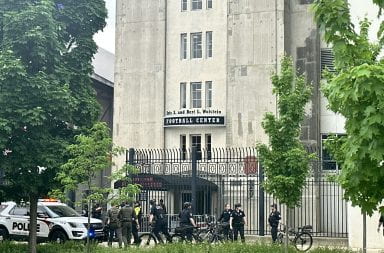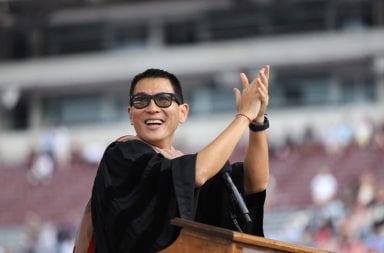When presidents and other high-profile visitors come to the Ohio State campus, university police are prepared. Fifteen officers form the Personal Protection Team, which works to protect high-profile visitors and employees of the university, including potential targets for hate groups arriving on campus.
The job is a non-traditional one that officers perform along with their full-time duties. Working on the team includes learning everything from dining etiquette to how to shoot a gun wearing a suit.
Members of the team have helped protect every U.S. president who has visited campus since Gerald Ford came in 1980, said Deputy Chief Richard Morman.
So far there have not been any major incidents on campus.
“If you do the planning right the actual event can flow smoothly,” said Capt. Dave Rose, team coordinator.
When asked what personal qualities are necessary for members of OSU police assigned to cover protection of high-profile visitors, Detective Pete Dragonette was ready with a response.
“I definitely think that to be a good candidate for the team you have to think on your feet,” he said. “Expect the unexpected.”
Dragonette was assigned to cover Sen. John Glenn’s visit for Spring 2009 Commencement, and has been a member of the Personal Protection Team for about a year.
Team members assigned to protection details have to think differently — Keeping focused on the individual they are protecting comes first, no matter what else might be happening around them.
“Your focus is keeping that one person safe for that assignment,” Dragonette said.
Controversy associated with a campus visitor can increase concerns about an assignment, he said.
The riskiest time for the visitor is during arrival and departure to an event, police say, and officers have to be close enough to act quickly in response to threats — whether that includes a threat to a dignitary’s life or a threat of embarrassment.
While assigned to cover someone, police need to be close, but not too close.
“Our motto is to be close enough to react if something happens, but not close enough that the protectee has to introduce us to someone,” Morman said.
Often working with the Secret Service or other police forces assigned to an individual, team members do whatever is needed to provide support.
Morman recalled a visit by Rabbi Meir Kahane, an American-Israeli rabbi who proposed mass immigration of Jews in the U.S. to Israel. Kahane was on campus in February 1990, and despite the controversy surrounding his political views, his visit went without incident. Kahane was fatally shot in November of that year after giving a speech in New York City.
The current Personal Protection Team is a diverse group, and many members of the team have medical training, Rose said.
Team members have trained other law enforcement units in the past, and they coordinate about 100 protective details a year.
And although the team has managed to avoid catastrophes involving high-profile visitors, the officers are always trying to get better.
“You’re always trying to improve and do things differently that might work better,” Dragonette said.


